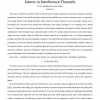Free Online Productivity Tools
i2Speak
i2Symbol
i2OCR
iTex2Img
iWeb2Print
iWeb2Shot
i2Type
iPdf2Split
iPdf2Merge
i2Bopomofo
i2Arabic
i2Style
i2Image
i2PDF
iLatex2Rtf
Sci2ools
CORR
2007
Springer
2007
Springer
A New Perspective on Multi-user Power Control Games in Interference Channels
This paper considers the problem of how to allocate power among competing users sharing a frequency-selective interference channel. We model the interaction between these selfish users as a non-cooperative game. As opposed to the existing iterative water-filling algorithm, which studies the myopic behavior of users, this paper studies how a foresighted user, who knows the channel state information and response strategies of its competing users, should behave. To characterize this multi-user interaction, the Stackelberg equilibrium is introduced, and the existence of this equilibrium for the investigated non-cooperative game is shown. We analyze such interactions in more detail using a simple two-user example, where we define the strategic behavior of a foresighted user as a bi-level programming problem, and derive the necessary optimality conditions. It is analytically shown that a foresighted user can improve its performance, if it has the required information about its competitors. ...
CORR 2007 | Education | Foresighted User | Iterative Water-filling Algorithm | Non-cooperative Game |
| Added | 18 Dec 2010 |
| Updated | 18 Dec 2010 |
| Type | Journal |
| Year | 2007 |
| Where | CORR |
| Authors | Yi Su, Mihaela van der Schaar |
Comments (0)

